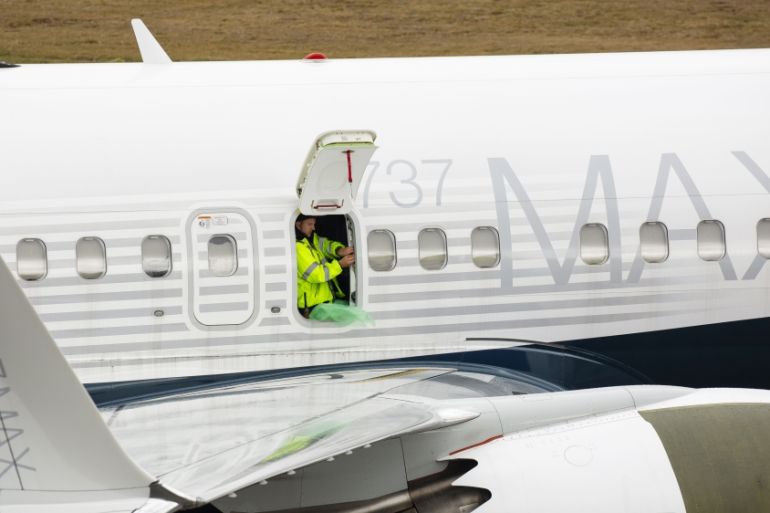US investigator: Inspectors weren’t qualified for 737 Max work
US aviation regulator disputes allegation, says all inspectors were qualified to work on Boeing plane.

Federal investigators in the United States say some safety inspectors who helped set pilot-training standards for the Boeing 737 Max aircraft were unqualified and the Federal Aviation Administration (FAA) seemed to mislead the US Congress about their competency.
The FAA disputed part of the investigators’ conclusions on Tuesday. The agency said all the inspectors who evaluated the Max were fully qualified for the work they did, and it stood by its statements to Congress.
Keep reading
list of 4 itemsMore than 11,000 evacuated in northern Indonesia as volcano erupts
Jordan, Lebanon, Iraq reopen airspace closed over Iran’s attacks on Israel
Australian women lose bid to sue Qatar Airways over 2020 strip searches
The Max remains grounded since mid-March, not long after the crash of a Max-operated Ethiopian Airlines shortly after takeoff from Addis Ababa. That followed the October 2018 crash of a Lion Air Max off the coast of Indonesia.
Boeing is nearing completion of changes that it hopes will persuade regulators to let the aircraft fly again, and pilot training has emerged as a key issue.
The standoff between investigators and the FAA stems from a whistle-blower complaint that was investigated by the US Office of Special Counsel.
The special counsel’s disclosures are another setback for the FAA, which is already under scrutiny for its certification of the 737 Max. According to published reports, senior FAA officials did not understand a key flight-control system that was later implicated in the two crashes that killed 346 people.
The FAA determined that 16 of 22 inspectors in Seattle and Long Beach, California, had not finished their formal training, and of the 16, 11 did not hold a flight-instructor license, a requirement for the job. But, the FAA told a Senate committee this spring, that they worked on other planes and none of the unqualified inspectors helped write training standards for the Max.
The special counsel said that was not true, based on information from the whistle-blower and other evidence. Special Counsel Henry Kerner said it is possible that some Max inspectors were neither qualified to certify other pilots to fly nor to recommend how pilots should be trained for procedures and manoeuvres on the plane.
In letters to US President Donald Trump and key legislators, Kerner added that the FAA’s answers to Congress about the matter “appear to have been misleading”.
“The FAA’s failure to ensure safety inspector competency for these aircraft puts the flying public at risk,” Kerner said.
In response, the FAA said in a statement: “All of the Aviation Safety Inspectors who participated in the evaluation of the Boeing 737 Max were fully qualified for those activities.”
Then-acting FAA Administrator Daniel Elwell said in May that the whistle-blower’s complaint dealt with training requirements for inspectors on a different plane.
Regulators knew of unusual controls
The FAA and its European counterpart, the European Union Aviation Safety Agency (EASA), were also called out for being aware of an unusual method for controlling the Max’s nose angle, which may have been an issue in the recent disasters concerning the aircraft, a document shows.
Although the EASA said that the additional procedures and training would “clearly explain” to pilots the need to manipulate a rarely-used manual wheel, these were not listed in the flight manual, according to a copy from American Airlines seen by the Reuters news agency.
The EASA and FAA ultimately determined that the set-up was safe enough for the plane to be certified, however.
In the EASA document, the regulator said simulations showed the electric thumb switches could not keep the 737 MAX properly positioned under certain conditions, including those of the Lion Air and Ethiopian Airlines crashes, according to the Indonesian preliminary report and a source with knowledge of the Ethiopian air traffic control recordings.
The flight conditions were similar to those described in the EASA document, a source at Lion Air told Reuters. The source said that training materials before the crash did not say the wheel could be required under those conditions but that Boeing advised the airline about it after the crash.
Boeing declined to comment on the EASA document or its advice to Lion Air, citing the ongoing investigation into the crash.